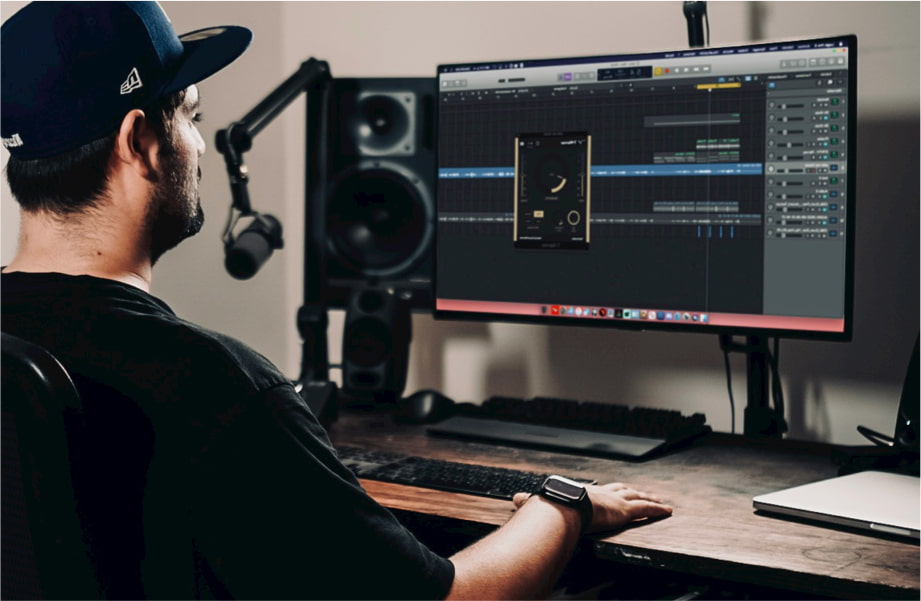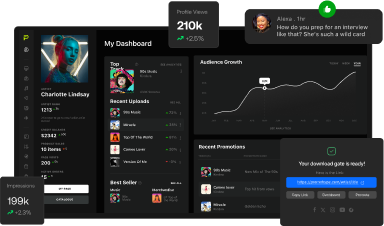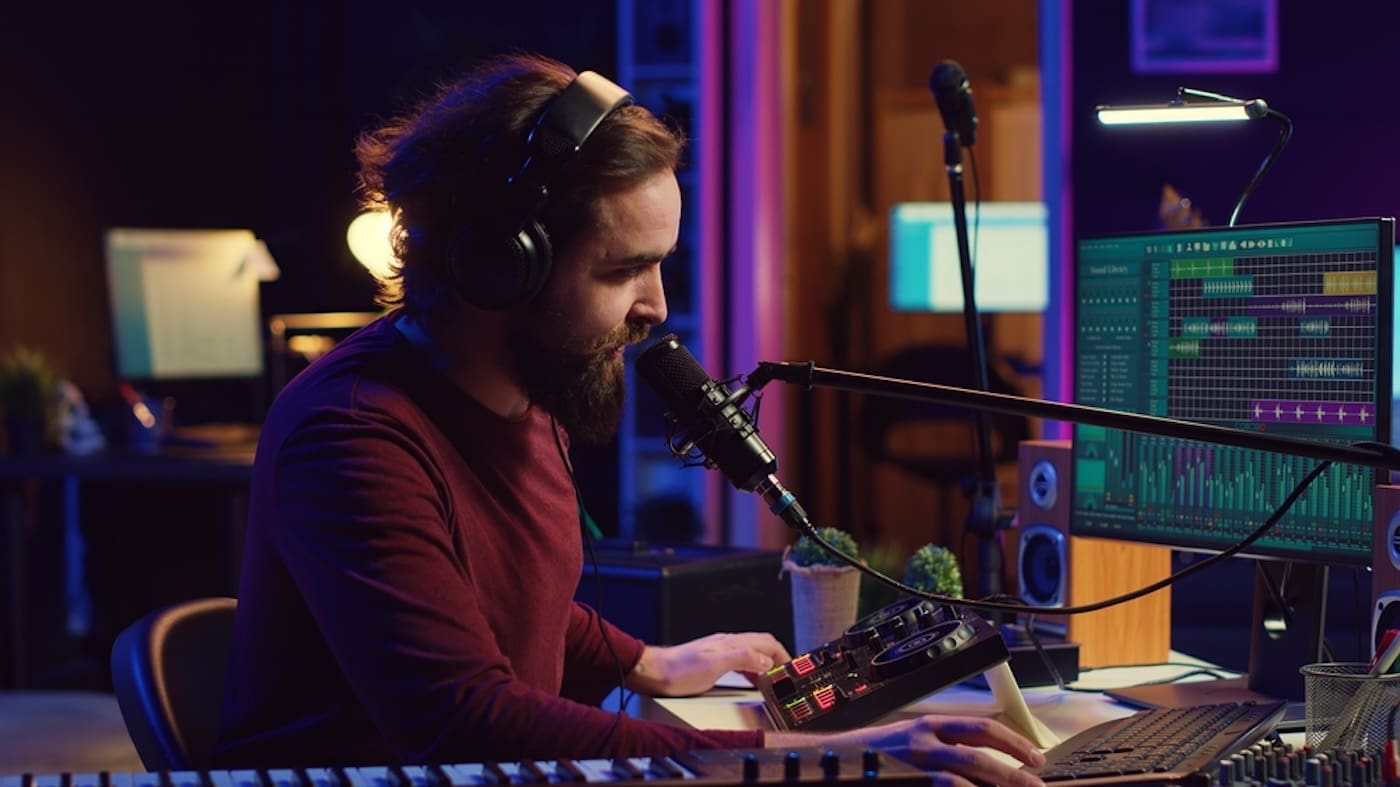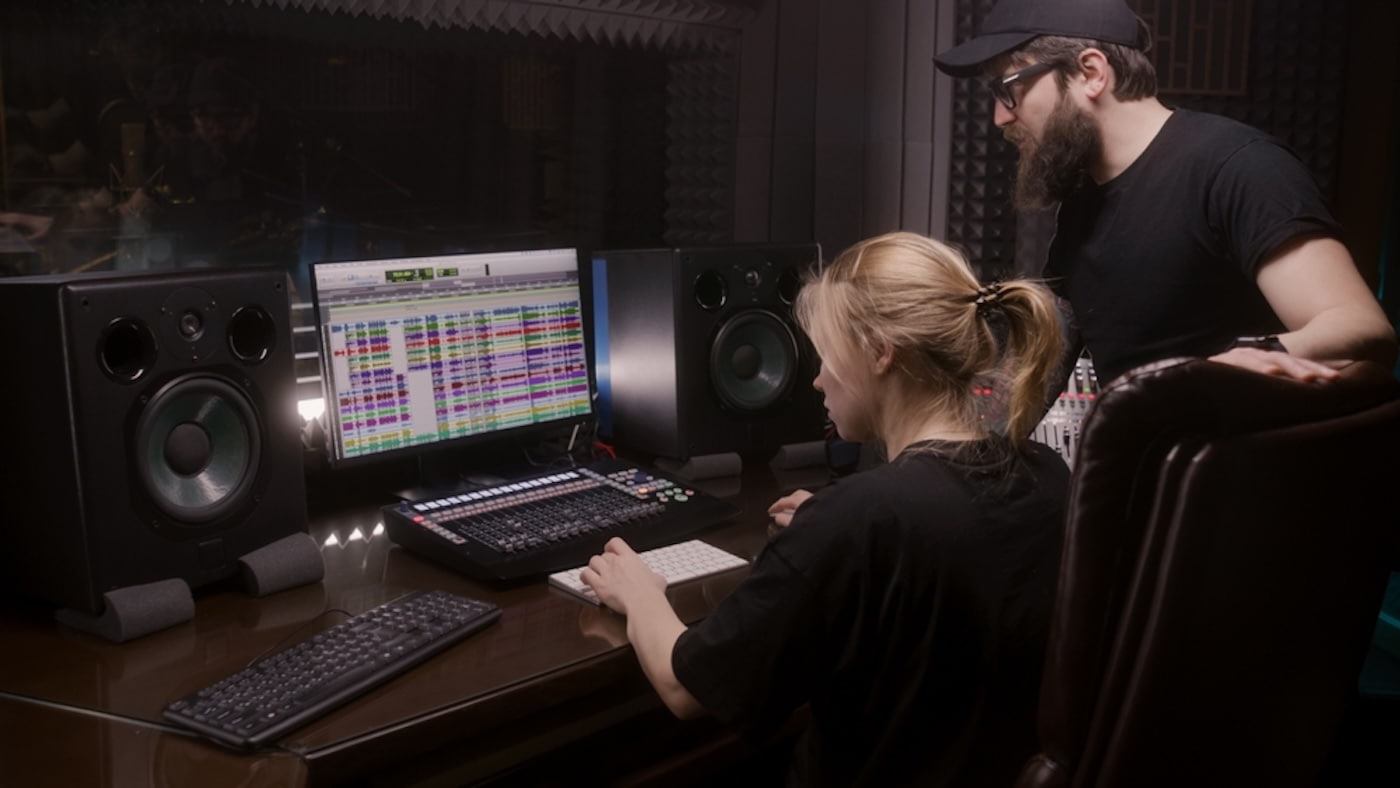
Behind every chart-topping hit and underground classic is a complex process involving numerous skilled professionals working together to craft the perfect sound. One key figure guides the project from concept to completion.
That person, the music producer, is often the industry’s unsung hero, who has enormous influence over how songs sound when they reach our ears.
If you’re interested in breaking into the music industry or curious about how contemporary songs are created, we examine the role of a music producer.
Get Early Access
To Promo Hype
Who Is A Music Producer?
In the simplest of terms, a music producer is the creative and technical leader who oversees the creation of a musical recording. They are the visionary behind the sound, the coach for the performers, and the technical expert who brings it all together.
Music producers work closely with artists to refine raw musical ideas into polished and professional recordings. You could say they are the film directors of the music world; they guide the overall creative process while managing all the technical aspects to bring it to life.
What Does A Music Producer Do?
A music producer’s responsibilities are vast and varied, touching every aspect of the recording process. They wear many hats, including those of creative consultants, technical experts, project managers, and performance coaches.
The role changes depending on the genre, the artist, and the specific project goals. Some producers are heavily involved in songwriting and arrangement. Others focus more on capturing perfect performances or crafting innovative sounds with some of the best music production software in the industry.
Music Producer Skills And Responsibilities
The best music producers tailor their approach to each project’s specific needs. They possess a unique combination of creative vision, technical expertise, and interpersonal abilities.
Producers’ skills have been developed through years of experience, learning, and a genuine passion for music. They must understand the artistic and business aspects of creating music and the structure of songs.
Music producers are often musicians in their own right. They will have an understanding of music theory and structure, which they use to create a professional sound.
Successful music producers develop a broad skill set to navigate the complex challenges of bringing projects from concept to completion. Here’s a breakdown of the skills and responsibilities of a music producer.
1. Schedules Recording Sessions
One of a music producer’s responsibilities is planning and scheduling all the necessary recording sessions. This process requires coordinating the availability of artists, session musicians, recording studios, and technical staff.
Producers must determine the time required for each project phase, from pre-production rehearsals to tracking various instruments, vocal recording, mixing, and mastering. Careful scheduling ensures that studio time is used efficiently and the project stays within budget and timeline.
Promote your music with Promo Hype.
2. Manages Client Budget
Music producers will often control the financial aspects of a music project. They help to allocate the budget and manage expenses, including studio rental, equipment, musician fees, mixing, and mastering.
For independent artists with limited resources, producers must be especially creative in maximizing value while minimizing costs. Managing the budget may involve prioritizing which elements receive the most investment or exploring innovative alternatives to more expensive options.
Being smart about budgeting helps to direct financial resources where they’ll have the most impact on the finished product.
3. Builds The Team
A skilled producer will assemble the right team, usually including an audio engineer, assistant producer, arranger, and programmer. Projects will also use specialized technicians for specific instruments or effects.
The producer assesses the project’s needs and recruits individuals with the necessary expertise. Building an effective team also means fostering a collaborative environment where everyone shares a clear understanding of the vision and works cohesively toward achieving it.
Established music producers will have a vast network of skilled professionals. As a budding music producer, growing and developing your contacts will pay off in the long run.
4. Hires Session Musicians
Most recording projects will require additional musicians beyond the leading artist or band. Music producers identify the instruments or vocal talents needed and bring in the right musicians to fill these roles.
Session musicians are typically incredibly talented individuals who possess a deep understanding of how to make good music.
Session players are selected not only for their technical ability but also for their stylistic compatibility with the project. They can add crucial elements to recordings, including string sections, horn arrangements, and instrumental solos.
5. Arranges The Songs
A music producer’s job is to help arrange songs to maximize their impact. Decisions about arrangement involve structure, instrumentation, dynamics, and pacing.
Producers might suggest extending a chorus, adding a bridge, changing the key, or altering the rhythm to make a song more compelling. Making the right arrangement choices will impact how listeners experience the music.
A skilled arranger knows how to produce music that builds tension and release, creates emotional arcs, and highlights the most essential elements of a song. The most successful music producers can transform a basic song through thoughtful arrangement into something that resonates powerfully with audiences.
6. Coaches The Artists
One key role of a music producer is coaching performers to deliver their best possible work. Effective coaching involves providing constructive feedback and suggesting techniques for improvement.
It is also essential that the artist feels comfortable performing and taking risks. A producer will help create an environment enabling artists to showcase their talents fully.
Producers need to know when to request another take and when a performance has achieved the right emotional quality. They bring out authentic, emotionally compelling performances that connect with listeners.
A great music producer often helps artists tap into their genuine feelings during a recording session. Many successful independent artists credit experienced producers for helping shape their sound.
Connect with independent artists in the Promo Hype community.
7. Audio Engineering And Sound Design
Technical skill is part of a producer’s creative toolkit. While many producers work with dedicated audio engineers, most also possess strong, specialized knowledge.
Knowing the proper microphone selection, placement, signal processing, and mixing techniques helps producers achieve their vision.
Clever and innovative sound design is essential in modern music productions. Producers often create unique sounds through synthesis, sampling, and processing that become signature elements of the recording.
The technical aspects of music production have become an art form. A music producer’s job is to craft musical landscapes that are just as important as the notes and lyrics.
Get Early Access
To Promo Hype
Music Production Equipment
Modern music production relies on a combination of hardware and software tools. A core studio setup typically includes a computer with a Digital Audio Workstation (DAW), such as Pro Tools, Logic Pro, or FL Studio.
Multitrack recording equipment is the backbone of today’s production process, allowing producers to capture and manipulate individual instrument and vocal tracks separately.
The technology ranges from simple USB interfaces with a few inputs to sophisticated consoles in professional recording studios, which feature dozens of simultaneous recording channels.
High-quality preamps, converters, and a selection of dynamic and condenser microphones complete the essential gear required for capturing clean, detailed performances. A producer might also use MIDI controllers, synthesizers, drum machines, and outboard processors.
While professional recording studios offer access to comprehensive equipment, many producers now achieve impressive results with modest home studio setups. Home recording studios are becoming more common, provided the design is done well and acoustic treatments are used to dampen sound.
Sound equipment is more affordable than ever without compromising on power. Equipment can also be rented, which is a budget-friendly option when first starting.
Who Hires A Music Producer?
Record labels often employ producers to collaborate with their signed artists, particularly for major releases with high stakes. A record label will match artists with producers whose style and experience align with their vision.
Independent artists also hire producers, though often with more limited budgets. Finding the right producer to maximize resources while delivering professional results is crucial for these indie artists.
Other artists sometimes hire producers for specific expertise, such as electronic music production or orchestral arrangement. Beyond traditional music, music producers are increasingly sought after by film and television studios for arranging soundtracks.
More potential clients may include advertising agencies for commercial jingles and brand themes, as well as video game developers for immersive gaming soundscapes. YouTube content creators may utilize a producer for channel themes and background music.
The demand for professional sound extends to any industry where audio quality enhances the consumer experience or communicates a message more effectively.
Music Producer Salary: How Much Do Music Producers Make?
Music producers’ incomes vary dramatically based on their experience and industry connections. Established producers with a track record of hits can command substantial advances and royalty percentages.
Most producers are typically paid a flat fee and royalties on sales or streams. Normally, they receive an advance against future royalties, plus points on the record (a percentage of revenue) for major label projects.
The career outlook for producers remains positive, provided they are prepared to grow alongside the evolving music industry. Opportunities for music producers can go beyond traditional channels into film, gaming, and digital media.
Earning potential in music production also varies significantly by genre and market segment. Producers working in commercial pop, hip hop, and electronic dance music often have more opportunities for lucrative projects than those in more niche genres.
Great producers can earn millions annually through production fees, publishing royalties, and brand partnerships. Mid-level professionals can make a comfortable living from a steady stream of projects.
Many producers also diversify their income streams by creating sample packs, developing signature plugin effects, or licensing beats directly to artists. A great producer knows how to write a song and may continue to release their own music.
As streaming continues to dominate the music industry, producers must understand how royalty structures work to maximize earning potential.
How To Become A Music Producer
There is no single definitive path to becoming a music producer. Some record producers start as musicians or songwriters, while others begin as engineers or DJs.
For example, John Legend transitioned from being an in-demand session pianist and vocalist to becoming a respected music producer. He leverages his exceptional talent in music and the industry connections he established while working with artists such as Lauryn Hill and Kanye West.
Many other successful producers started making their own music in their bedroom studios long before collaborating with other artists.
One straightforward route to a music production career is through formal education and music production schools, which can provide a solid foundation. Many universities and colleges offer degrees in music production or recording technology.
When you start this career path, remember that hands-on experience is invaluable. Find work as a production assistant, intern, or recording engineer to gain practical knowledge and industry connections.
Building a portfolio of work is essential, even if it means offering free or discounted services initially to gain experience. Most record producers start small and gradually progress to larger projects as they establish their reputation and refine their music production skills.
Networking within the music business is also crucial, as many opportunities come through personal connections. Sometimes, it can be a case of not knowing what you know but who you know.
Summary
A music producer is a multi-talented individual with an incredible range of responsibilities. They must be a creative visionary and technical expert, a project manager, and a performance coach.
Producers shape the sound of our musical landscape by bringing together artists, technology, and innovative ideas to create the music we all know and love.
If you are looking to enter this fascinating industry, you’ll need to develop a broad range of skills and gain experience across multiple aspects of music. While it can be challenging, a career as a music producer offers the opportunity to make a lasting impact on the music industry.
Whether working with major stars or emerging talents, music producers help transform raw musical ideas into the songs that become the soundtrack to our lives.
Get Early Access
To Promo Hype
Join Promo Hype






